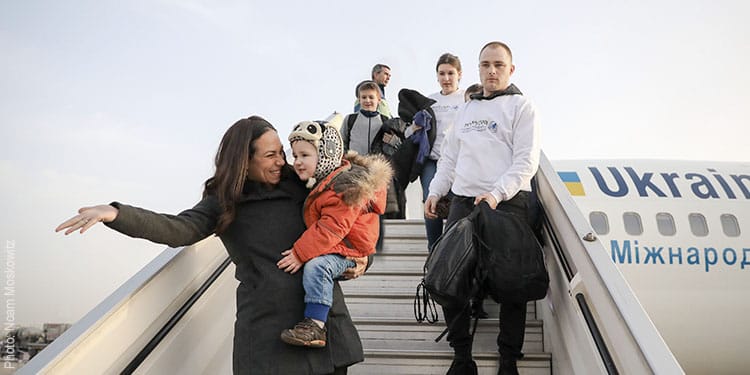In Israel, poverty often begins early in life. Research by the Taub Center for Social Policy Studies in Israel found that nearly one-third of children under age 4 lived below the poverty line in 2018.
Among minority populations, the numbers were even more staggering. Roughly 58 percent of Haredi children and 55 percent of Arab children in that age group lived in households struggling to meet their most basic needs.
Behind those figures are young parents doing everything they can to stay afloat, often working long hours for low pay and stretching each paycheck to cover food, clothing, and rent. Yet even in homes where both parents were employed, one in 10 young children still lived in poverty.
That same year, Israel’s overall poverty rate stood at 18 percent, one of the highest in the developed world, revealing a national crisis.
Amid this hardship stands the International Fellowship of Christians and Jews (IFCJ), led by President and Global CEO Yael Eckstein. The organization provides food, clothing, medicine, and other essential aid to families and elderly residents across Israel, bringing together Christian and Jewish supporters through a shared belief in caring for the most vulnerable.
Faith at Work in Israel and Beyond
IFCJ was founded in 1983 by Rabbi Yechiel Eckstein, a Orthodox rabbi who believed that faith should inspire action. From the start, his vision was to unite Christian and Jewish communities while offering humanitarian assistance to those in need.
Today, that mission continues under the leadership of his daughter, Yael Eckstein, supported by hundreds of thousands Christian and Jewish donors worldwide.
IFCJ’s work reaches families who reflect the realities identified by the Taub Center’s research — households with limited income or a single wage earner struggling to meet basic needs. According to their research, households with no wage earners faced poverty rates of 87 percent, while single-income families faced rates around 57 percent.
The Fellowship’s programs are designed to help families living under these conditions by providing food cards to parents who are between jobs and vouchers for clothing and school supplies during the holidays.
In 2024 alone, IFCJ assisted about 973,000 children and families with basic necessities, like food, medicines, and clothing More than 40 Fellowship-funded soup kitchens served roughly three million hot meals during the year, and volunteers delivered groceries and medicine to elderly residents confined to their homes.
That same year, IFCJ’s humanitarian reach extended worldwide, touching the lives of more than two million people in total. Around 136,000 Holocaust survivors and elderly Jews received food, medicine, and warm blankets.
Another one million people benefited from the organization’s security programs, which equipped hospitals, synagogues, and first responders with vital safety resources. Through its aliyah assistance initiatives, more than 6,000 people immigrated to Israel, part of a broader mission that has enabled over 780,000 Jews to return to their homeland since 1983.
How IFCJ Supports Israel’s Most Vulnerable Families
The Taub Center’s findings show that poverty during early childhood reaches beyond income levels and into daily living conditions. Families living below the poverty line spend less on education and early childhood programs, limiting opportunities for development before formal schooling begins.
Many live in crowded housing or in neighborhoods ranked among Israel’s lowest socioeconomic clusters. Despite these hardships, home ownership remains common. Eighty two percent of Arab families and 72 percent of Haredi families living in poverty own their homes, compared to 40 percent of non-Haredi Jewish families.
IFCJ’s work addresses these daily realities with programs that provide more than food alone. Holocaust survivors receive home visits, medication, and winter heating vouchers. Elderly residents who might otherwise live in isolation are supported through home visits that provide companionship. The organization also funds shelters for women escaping abuse, ensuring they have safe housing and support while they rebuild their lives.
Additionally, IFCJ programs provide emergency call buttons that connect Holocaust survivors with medical hotlines, vehicles for municipalities to help elderly residents reach medical appointments, and professional training opportunities for young adults seeking stable employment. IFCJ also supports minority communities in Israel, including Christians, Druze, and Bedouins.
Where Every Dollar Makes a Difference
Under Yael Eckstein’s guidance, IFCJ has grown into one of the largest humanitarian organizations operating in Israel. It has raised more than $273 million annually in recent years, primarily from Christian supporters around the world, and has raised more than $3.6 billion since its founding.
The organization operates offices in Jerusalem, Chicago, Toronto, and Seoul, coordinating aid across more than 40 countries. Its programs are structured around four pillars, which include alleviating poverty, providing security, making aliyah, and supporting fellowship.
IFCJ is accredited by the Better Business Bureau’s Wise Giving Alliance, holds a four-star rating from Charity Navigator, and maintains a Platinum Seal of Transparency from Candid. It also appears on Forbes’ list of America’s Top 100 Charities.
The organization reports that 76 cents of every dollar donated goes directly to humanitarian aid. Executive compensation, including Yael Eckstein’s salary, is fully disclosed through IFCJ’s audited financial statements and IRS Form 990 filings, ensuring accountability at every level.
This transparency contributes to consistently high trust among supporters and a strong IFCJ rating from independent charity evaluators, alongside positive IFCJ reviews from donors and partners alike.
Leading With Purpose: The Voice Behind IFCJ
As the President and Global CEO, Eckstein’s influence extends well beyond the organization’s humanitarian reach. Her work has positioned her as a leading voice for Jewish-Christian understanding and as one of Israel’s most visible advocates on the global stage.
Through interviews, public speaking, and media appearances, she connects faith communities with the realities of life in Israel, bringing stories of resilience to millions of listeners around the world.
Eckstein was born in Evanston, Illinois and studied Jewish and sociology studies at Queens College in New York. She continued her education with biblical studies at Torat Chesed Seminary in Israel, taking additional coursework at Hebrew University in Jerusalem.
Before becoming President and Global CEO of the Fellowship, she served as Global Executive Vice President, Senior Vice President, and Director of Program Development and Ministry Outreach.
She currently lives in Israel with her husband and their four children.
Eckstein is the author of “Holy Land Reflections,” “Spiritual Cooking with Yael,” and “Generation to Generation: Passing on a Legacy of Faith to Our Children.” Her podcast, Nourish Your Biblical Roots, explores faith and community in conversation with guests such as Prime Minister Benjamin Netanyahu, Michele Bachmann, and Dr. Alveda King.
She also appears frequently on radio and television programs, including “The Sean Hannity Show,” “The Ben Shapiro Show,” and “Verdict with Ted Cruz,” where she shares insights on Jewish-Christian relations and humanitarian work.
The Jerusalem Post has named Eckstein one of the 50 Most Influential Jews multiple times and honored her with its 2023 Humanitarian Award. She was also included in The Algemeiner’s Jewish 100 and Future of Jewish’s list of 50 leading Jewish women.
Standing On the Frontlines of Change
The Taub Center has urged Israel to adopt reforms that improve income support, expand early childhood education, and create better incentives for parents to join the workforce. While those long-term solutions take shape, the International Fellowship of Christians and Jews continues to meet the most immediate needs.
Each of its programs carries forward Rabbi Eckstein’s founding belief that compassion must be expressed through action, transforming faith into tangible care for people in need. More than 40 years later, that conviction still guides IFCJ’s initiatives and partnerships.
As Israel faces the ongoing reality that nearly one-third of its youngest children still live below the poverty line, the organization’s work remains as urgent as ever. Through faith, transparency, and a worldwide community of supporters, IFCJ continues to lead a mission that turns statistics into stories of survival and hope.
The Editorial Team at Healthcare Business Today is made up of experienced healthcare writers and editors, led by managing editor Daniel Casciato, who has over 25 years of experience in healthcare journalism. Since 1998, our team has delivered trusted, high-quality health and wellness content across numerous platforms.
Disclaimer: The content on this site is for general informational purposes only and is not intended as medical, legal, or financial advice. No content published here should be construed as a substitute for professional advice, diagnosis, or treatment. Always consult with a qualified healthcare or legal professional regarding your specific needs.
See our full disclaimer for more details.








